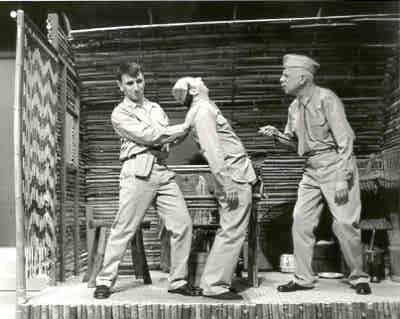|
The Little Theater of Alexandria Production of The Teahouse of the August Moon The Washington Post September 11, 2003 |
 Bob Scott as Captain Fisby, Paul Tamney as Sergeant Gregovich, and
Philip Baedecker as Colonel Purdy III
Bob Scott as Captain Fisby, Paul Tamney as Sergeant Gregovich, and
Philip Baedecker as Colonel Purdy III |
|
The Little Theater of Alexandria Production of The Teahouse of the August Moon The Washington Post September 11, 2003 |
 Bob Scott as Captain Fisby, Paul Tamney as Sergeant Gregovich, and
Philip Baedecker as Colonel Purdy III
Bob Scott as Captain Fisby, Paul Tamney as Sergeant Gregovich, and
Philip Baedecker as Colonel Purdy III |
| washingtonpost.com
'Teahouse' Serves Up Full Plate of Laughs By Michael Toscano
You can have tea several ways -- hot and bracing or cool and refreshing. That apparently holds true for teahouses as well, as evidenced by Little Theatre of Alexandria's all-out comic approach to "The Teahouse of the August Moon," the story of American military men trying to teach American values to the local population of post-World War II Okinawa. John Patrick's Pulitzer Prize-winning play can be performed in a manner that concentrates on its thoughtful and subtle satire, with its messages of American jingoism and culture clash. There's even a bit of a love story. Or it can be played coolly and strictly for laughs, never straying below surface situations that lend themselves to slapstick. Director Roland Branford Gomez has chosen the latter, creating a "McHale's Navy" type of show. Slapstick comedy depends on stereotypes, and this 1953 play is full of them. The men of the American Occupation Forces are easily played as bumblers, while the island's natives are gentle, patient and wily, always having their way at the expense of the dull-witted foreigners. Addled Col. Wainwright Purdy (Philip Baedecker) sends young Capt. Fisby (Bob Scott) out to the remote village of Tobiki, where his mission is to build a pentagon-shaped schoolhouse, teach the locals about American-style democracy and revive the economy. A local interpreter, the clever, bubbly Sakini (Brandon DeGroat) is sent along to help but, of course, actually sees to it that Fisby is overwhelmed and subsumed by the island culture. As might be expected, the locals end up teaching the Americans a thing or two about democracy as Army rules are twisted and its authority figures are good-naturedly tweaked. Instead of a school, the villagers use the Army materials to build a teahouse, where local women can learn to become geishas and the economy is revived by production of bootleg booze. Gomez's comedic approach is well served by the performances of several lead actors, particularly veteran Baedecker and newcomer DeGroat, who take radically different approaches to the material. Baedecker, employing his best Robert Stack, no-nonsense delivery, actually plays it rather straight much of the time as he revels in military temperament, making his occasional forays over the top into slapstick marvelously funny. It is an effective counterpoint to DeGroat's Sakini, who mugs, smiles, leaps and rolls about the stage while acting as narrator of the tale. DeGroat takes it almost to the point of insufferable ethnic offensiveness but carefully reins it in whenever the line between slapstick and racial insult becomes too fine. Another veteran of the Wolfe Street stage, James Howard, makes a vivid impression in a supporting role as Capt. McLean, an Army shrink whom Col. Purdy sends to the village to find out what's happened to Capt. Fisby. McLean is quickly enchanted by what he finds and goes a bit native himself, with Howard's physical presence and voice quite expressive. Bob Scott is significantly blander and constrained in the key role of Fisby, a characterization that cries out for precise comic timing and loose-limbed physical reactions. Perhaps he'll loosen up during the run of the show. For a comedy, this production has considerable spectacle. The audience oohs and aahs at the sight of the newly built teahouse, one of the striking yet simple sets designed by John Downing and Bill Glikbarg that also include massive Japanese-style screens in place of a traditional curtain during scene changes. A bevy of cute kids wins applause merely by being cute and on the stage, the audience boos when the colonel begins his inevitable crackdown on the town's mischief and several well-trained goats draw laughs and applause for their precise movements. "The Teahouse of the August Moon" by Little Theatre of Alexandria, runs through Sept. 27 at 600 Wolfe St. Showtime is 8 p.m. Wednesdays through Saturdays with 3 p.m. matinees on Sundays. |